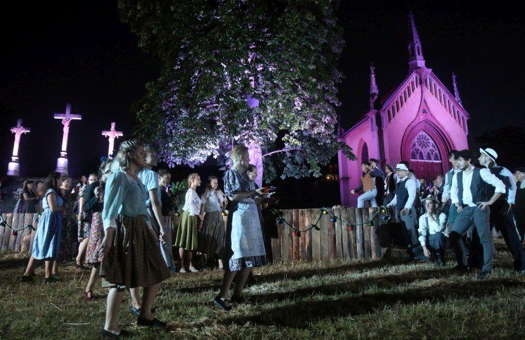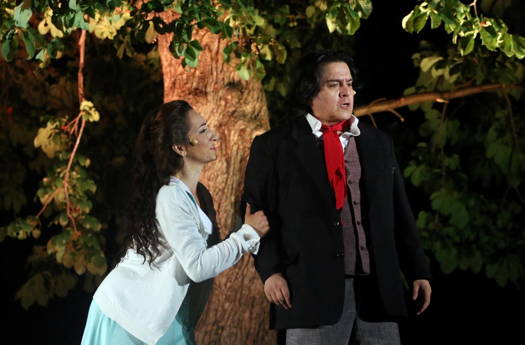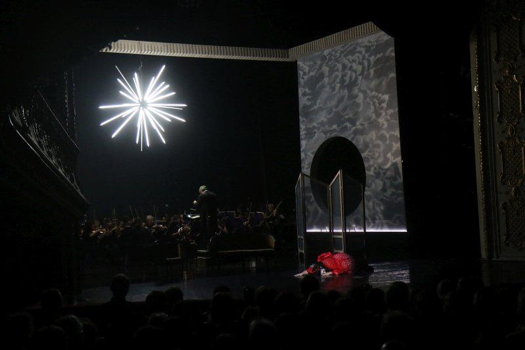- Dukas
- Salzburg
- Riccardo Chailly
- Nicola Antonio Porpora
- Castelnuovo-Tedesco
- Stuart Kale
- John Williams: Schindler's List
- Luis Humberto Salgado
 DISCUSSION: What is a work? John Dante Prevedini leads a discussion about The performing artist as co-creator, including contributions from Halida Dinova, Yekaterina Lebedeva, Béla Hartmann, David Arditti and Stephen Francis Vasta.
DISCUSSION: What is a work? John Dante Prevedini leads a discussion about The performing artist as co-creator, including contributions from Halida Dinova, Yekaterina Lebedeva, Béla Hartmann, David Arditti and Stephen Francis Vasta.
 FEEDBACK: She said WHAT? Read what people think about our Classical Music Daily features, and have your say!
FEEDBACK: She said WHAT? Read what people think about our Classical Music Daily features, and have your say!
Italian Operas in Miskolc
ANETT FODOR sends her final report from the
2019 Bartók Plus Opera Festival
A Large-Scale Outdoor Performance
Tosca with Cannon Shots
Gergely Kesselyák is the Director of the Miskolc Bartók Plus Opera Festival and Chief Conductor of the Hungarian State Opera. When I asked him what the festival's most considerable success was, he replied, without a moment's hesitation, 'It's the decision to take our operas outdoors'. One of the most memorable performances in the festival's history, in his opinion, was its 2012 version of Tosca performed on the Avas Hill. It was an avant-garde production with car wrecks, seventeen cannon shots and hanged dummies as corpses! All this naturally aroused people's curiousity. They gathered on the hill constantly, both before and during the performance. Fascinated, they were eager to see the festival production. This large-scale performance was a huge success!
Seven Years Later
Cavalleria Rusticana
Pietro Mascagni's Cavalleria Rusticana is a musical masterwork, a weave of both sentiment and separation. It is brim-full with wonderful melodies and deep emotion. This one-act opera was performed at the Miskolc Bartók Plus Opera Festival on 21 June 2019.
The main square of a Sicilian village is the usual stage set for this work. Remaining true to the festival's proclivity for the unexpected, as mentioned above, the chosen setting this year was truly exceptional. Miskolc' sublime Calvary Hillside proved to be an ideal setting for this performance. A little chapel and a portrayal of Calvary stand on top of the hill. In front of them, two stages - one small and one larger, were built.

Mascagni's Cavalleria Rusticana on the Calvary Hillside of Miskolc. Photographer unknown, but possibly © 2019 János Vajda. Photo courtesy of the Bartók Plus Opera Festival
The Orchestra of the Miskolc National Theatre, conducted by Balázs Kocsár, was seated behind them in front of the chapel. The Asan Civic Choir and the Choir of the Miskolc National Theatre took part in this production. Both of them abounded in really excellent voices.
The conductor stood with his back to the singers and choirs. I am sure it was a difficult and challenging task holding all of the musicians and singers together for seventy-five minutes. Mr Kocsár accomplished this mission most successfully.
Hector Lopez Mendoza (Turiddu), Gabriella Balga (Santuzza), Veronika Dobi-Kiss (Lucia), Zsolt Haja (Alfio), as well as Eszter Balogh (Lola) sang and interpreted their roles admirably; the audience was overwhelmed by the quality of their performance.

A scene from Mascagni's Cavalleria Rusticana. Photo © 2019 János Vajda
The free, outdoor performance - directed by Paolo Panizza - was spectacular! It was a musical delight to which the beautiful scenery, the costumes, even two horses and a carriage - combined to make this a sumptuous interpretation in the late evening light.
Mascagni's Seventh Opera
Iris
On 22 June 2019, Mascagni's Iris was performed in the Miskolc National Theatre.
The opera was premiered in 1898 and given frequently all over the world until 1915. Sadly, Iris has been infrequently programmed over the last hundred years. It has fallen out of favour, as it is rather difficult to follow the somewhat obscure plot.
The story takes place in Japan. Mascagni had chosen this oriental libretto six years before Puccini wrote Madame Butterfly. Interestingly, they both had the same librettist, Luigi Illica. A rich nobleman, Osaka, kidnaps Iris and sells her to a brothel. Iris commits suicide in despair. Her soul wanders through darkness and turns into sunshine. There is not much action in the story, which is why Mascagni honed his original work by inserting dance scenes and lyrical passages to maintain interest. He had originally feared the libretto was not sufficiently captivating. This added material featured either orchestral interludes or additional vocal ones. As far as the music at large is concerned, it enjoys a finely woven orchestration with close harmonies. The composer said of his work that this was an opera 'with almost too much music in it'!
Iris was the guest performance of the Josef Kajetán Tyl Theatre of Plzeň in the Czech Republic.

A scene from Mascagni's Iris. Photographer unknown, but possibly © 2019 János Vajda. Photo courtesy of the Bartók Plus Opera Festival
The orchestra - conducted by Jiří Štrunc - was seated at the back of the stage. The soloists, choir and dancers presented their contributions in front of them.
The most significant stage set was a huge, sphere-like neon light, which represented the sun in the third act. All the artists wore traditional Japanese dress.
Pietro Mascagni's great-granddaughter, Signora Guia Farinelli Mascagni, graced both Cavalleria Rusticana and Iris by her presence.
Copyright © 29 June 2019 Anett Fodor, Hungary



